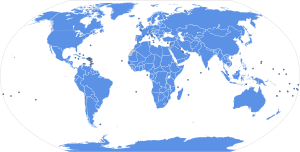Member states of the United Nations, all of which are sovereign states, though not all sovereign states are necessarily members.
In international law, a sovereign state, sovereign country, or simply state, is a nonphysical juridical entity that is represented by one centralized government that has sovereignty over a geographic area. International law defines sovereign states as having a permanent population, defined territory, one government, and the capacity to enter into relations with other sovereign states. It is also normally understood that a sovereign state is neither dependent on nor subjected to any other power or state.
While according to the declarative theory of statehood, a sovereign state can exist without being recognised by other sovereign states, unrecognised states will often find it hard to exercise full treaty-making powers and engage in diplomatic relations with other sovereign states.
Westphalian sovereignty
Westphalian sovereignty is the concept of nation-state
sovereignty based on territoriality and the absence of a role for
external agents in domestic structures. It is an international system of
states, multinational corporations, and organizations that began with the Peace of Westphalia in 1648.
Sovereignty is a term that is frequently misused.
Up until the 19th century, the radicalised concept of a "standard of
civilization" was routinely deployed to determine that certain people in
the world were "uncivilised", and lacking organised societies. That
position was reflected and constituted in the notion that their
"sovereignty" was either completely lacking or at least of an inferior
character when compared to that of the "civilized" people." Lassa Oppenheim
said, "There exists perhaps no conception the meaning of which is more
controversial than that of sovereignty. It is an indisputable fact that
this conception, from the moment when it was introduced into political
science until the present day, has never had a meaning which was
universally agreed upon." In the opinion of H. V. Evatt of the High Court of Australia, "sovereignty is neither a question of fact, nor a question of law, but a question that does not arise at all."
Sovereignty has taken on a different meaning with the development of the principle of self-determination and the prohibition against the threat or use of force as jus cogens norms of modern international law. The United Nations Charter, the Draft Declaration on Rights and Duties of States,
and the charters of regional international organizations express the
view that all states are juridically equal and enjoy the same rights and
duties based upon the mere fact of their existence as persons under
international law.
The right of nations to determine their own political status and
exercise permanent sovereignty within the limits of their territorial
jurisdictions is widely recognized.
In political science, sovereignty is usually defined as the most
essential attribute of the state in the form of its complete
self-sufficiency in the frames of a certain territory, that is its
supremacy in the domestic policy and independence in the foreign one.
Named after the 1648 Treaty of Westphalia, the Westphalian System
of state sovereignty, which according to Bryan Turner is "made a more
or less clear separation between religion and state, and recognized the
right of princes 'to confessionalize' the state, that is, to determine
the religious affiliation of their kingdoms on the pragmatic principle
of cuius regio eius religio [whose realm, his religion]."
Before 1900 sovereign states enjoyed an absolute immunity from the judicial process, derived from the concepts of sovereignty and the Westphalian equality of states. First articulated by Jean Bodin, the powers of the state are considered to be suprema potestas
within territorial boundaries. Based on this, the jurisprudence has
developed along the lines of affording immunity from prosecution to
foreign states in domestic courts. In The Schooner Exchange v. M'Faddon, Chief Justice John Marshall of the United States Supreme Court
wrote that the "perfect equality and absolute independence of
sovereigns" has created a class of cases where "every sovereign is
understood to waive the exercise of a part of that complete exclusive
territorial jurisdiction, which has been stated to be the attribute of
every nation".
Absolute sovereign immunity is no longer as widely accepted as it
has been in the past, and some countries including the United States, Canada, Singapore, Australia, Pakistan and South Africa have introduced restrictive immunity
by statute, which explicitly limits jurisdictional immunity to public
acts, but not private or commercial ones, though there is no precise
definition by which public acts can easily be distinguished from private
ones.
Recognition
State recognition signifies the decision of a sovereign state to treat another entity as also being a sovereign state.
Recognition can be either expressed or implied and is usually
retroactive in its effects. It does not necessarily signify a desire to
establish or maintain diplomatic relations.
There is no definition that is binding on all the members of the
community of nations on the criteria for statehood. In actual practice,
the criteria are mainly political, not legal. L.C. Green cited the recognition of the unborn Polish and Czechoslovak
states in World War I and explained that "since recognition of
statehood is a matter of discretion, it is open to any existing State to
accept as a state any entity it wishes, regardless of the existence of
territory or of an established government."
In international law, however, there are several theories of when a state should be recognised as sovereign.
Constitutive theory
The constitutive theory of statehood
defines a state as a person of international law if, and only if, it is
recognised as sovereign by at least one other state. This theory of
recognition was developed in the 19th century. Under it, a state was
sovereign if another sovereign state recognised it as such. Because of
this, new states could not immediately become part of the international
community or be bound by international law, and recognised nations did
not have to respect international law in their dealings with them. In 1815, at the Congress of Vienna the Final Act
recognised only 39 sovereign states in the European diplomatic system,
and as a result it was firmly established that in the future new states
would have to be recognised by other states, and that meant in practice
recognition by one or more of the great powers.
One of the major criticisms of this law is the confusion caused
when some states recognise a new entity, but other states do not. Hersch
Lauterpacht, one of the theory's main proponents, suggested that it is a
state's duty to grant recognition as a possible solution. However, a
state may use any criteria when judging if they should give recognition
and they have no obligation to use such criteria. Many states may only
recognise another state if it is to their advantage.
In 1912, L. F. L. Oppenheim said the following, regarding constitutive theory:
International Law does not say that a State is not in existence as long as it isn't recognised, but it takes no notice of it before its recognition. Through recognition only and exclusively a State becomes an International Person and a subject of International Law.
Declarative theory
By contrast, the declarative theory of statehood defines a state as a person in international law
if it meets the following criteria: 1) a defined territory; 2) a
permanent population; 3) a government and 4) a capacity to enter into
relations with other states. According to declarative theory, an
entity's statehood is independent of its recognition by other states, as
long as the sovereignty was not gained by military force. The
declarative model was most famously expressed in the 1933 Montevideo Convention.
Article 3 of the Montevideo Convention declares that political
statehood is independent of recognition by other states, and the state
is not prohibited from defending itself.
In contrast, recognition is considered a requirement for statehood by
the constitutive theory of statehood. An important part of the
convention was Article 11 that prohibits using military force to gain
sovereignty.
A similar opinion about "the conditions on which an entity constitutes a state" is expressed by the European Economic Community Opinions of the Badinter Arbitration Committee,
which found that a state was defined by having a territory, a
population, government, and capacity to enter into relations with other
states.
State recognition
State practice relating to the recognition of states typically falls
somewhere between the declaratory and constitutive approaches. International law does not require a state to recognise other states.
Recognition is often withheld when a new state is seen as illegitimate
or has come about in breach of international law. Almost universal
non-recognition by the international community of Rhodesia and Northern Cyprus are good examples of this, the former only having been recognized by South Africa, and the latter only recognized by Turkey. In the case of Rhodesia, recognition was widely withheld when the white minority seized power and attempted to form a state along the lines of Apartheid South Africa, a move that the United Nations Security Council described as the creation of an "illegal racist minority régime". In the case of Northern Cyprus, recognition was withheld from a state created in Northern Cyprus. International law contains no prohibition on declarations of independence, and the recognition of a country is a political issue. As a result, Turkish Cypriots gained "observer status" in the Parliamentary Assembly of the Council of Europe, and their representatives are elected in the Assembly of Northern Cyprus; and Northern Cyprus became an observer member of the Organisation of Islamic Cooperation and the Economic Cooperation Organization.
De facto and de jure states
Most sovereign states are states de jure and de facto (i.e., they exist both in law and in reality). However, a state may be recognised only as a de jure state, in that it is recognised as being the legitimate government of a territory over which it has no actual control. For example, during the Second World War, governments-in-exile of a number of continental European states continued to enjoy diplomatic relations with the Allies, notwithstanding that their countries were under Nazi occupation.[citation needed] The PLO and Palestinian Authority claim that the State of Palestine is a sovereign state, a claim which has been recognised by most states, though the territory it claims is under the de facto control of Israel.
Other entities may have de facto control over a territory but lack international recognition; these may be considered by the international community to be only de facto states. They are considered de jure states only according to their own law and by states that recognise them. For example, Somaliland is commonly considered to be such a state.
Relationship between state and government
Although the terms "state" and "government" are often used interchangeably, international law distinguishes between a non-physical state and its government; and in fact, the concept of "government-in-exile" is predicated upon that distinction. States are non-physical juridical entities, and not organisations of any kind. However, ordinarily, only the government of a state can obligate or bind the state, for example by treaty.
State extinction
Generally
speaking, states are durable entities, though it is possible for them
to become extinguished, either through voluntary means or outside
forces, such as military conquest. Violent state abolition has virtually
ceased since the end of World War II. Because states are non-physical juridical entities, it has been argued their extinction cannot be due to physical force alone.
Instead, the physical actions of the military must be associated with
the correct social or judiciary actions in order to abolish a state.
Ontological status of the state
The ontological status of the state has been the subject of debate, specially, whether or not the state, being an object that no one can see, taste, touch, or otherwise detect, actually exists.
The state as "quasi-abstract"
It
has been argued that one potential reason as to why the existence of
states has been controversial is because states do not have a place in
the traditional Platonist duality of the concrete and the abstract.
Characteristically, concrete objects are those that have position in
time and space, which states do not have (though their territories have
spatial position, but states are distinct from their territories), and
abstract objects have position in neither time nor space, which does not
fit the supposed characteristics of states either, since states do have
temporal position (they can be created at certain times and then become
extinct at a future time). Therefore, it has been argued that states
belong to a third category, the quasi-abstract, that has recently begun
to garner philosophical attention, especially in the area of documentality,
an ontological theory that seeks to understand the role of documents in
understanding all of social reality. Quasi-abstract objects, such as
states, can be brought into being through document acts, and can also be
used to manipulate them, such as by binding them by treaty or
surrendering them as the result of a war.
Scholars in international relations can be broken up into two
different practices, realists and pluralists, of what they believe the
ontological state of the state is. Realists believe that the world is
one of only states and interstate relations and the identity of the
state is defined before any international relations with other states.
On the other hand, pluralists believe that the state is not the only
actor in international relations and interactions between states and the
state is competing against many other actors.
The state as "spiritual entity"
Another theory of the ontology of the state is that the state is a spiritual, or "mystical entity" with its own being, distinct from the members of the state. The German Idealist philosopher Georg Hegel (1770–1831) was perhaps the greatest proponent of this theory. The Hegelian definition of the state is "the Divine Idea as it exists on Earth".
Trends in the number of states
Since the end of World War II, the number of sovereign states in the international system has surged.
Some research suggests that the existence of international and regional
organisations, the greater availability of economic aid, and greater
acceptance of the norm of self-determination have increased the desire
of political units to secede and can be credited for the increase in the
number of states in the international system. Harvard economist Alberto Alesina and Tufts economist Enrico Spolaore argue in their book, Size of Nations,
that the increase in the number of states can partly be credited to a
more peaceful world, greater free trade and international economic
integration, democratisation, and the presence of international
organisations that co-ordinate economic and political policies.







